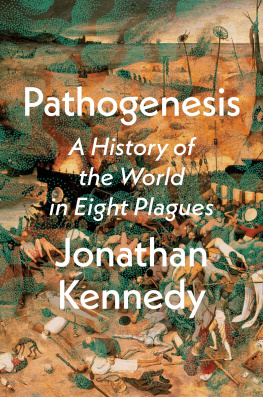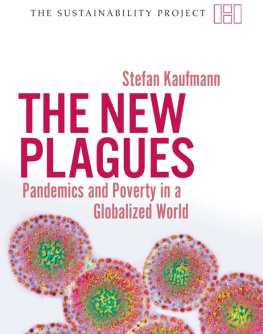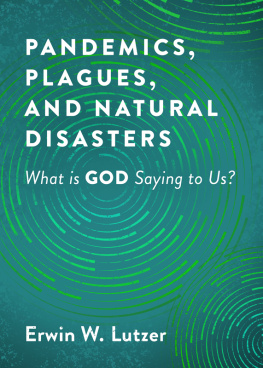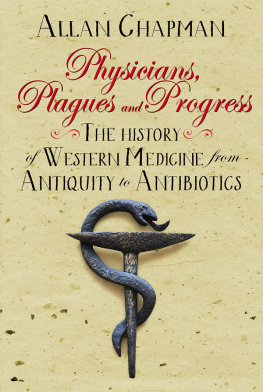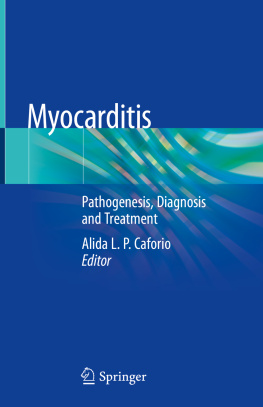Jonathan Kennedy - Pathogenesis : A History of the World in Eight Plagues
Here you can read online Jonathan Kennedy - Pathogenesis : A History of the World in Eight Plagues full text of the book (entire story) in english for free. Download pdf and epub, get meaning, cover and reviews about this ebook. year: 2023, publisher: Penguin Random House LLC, genre: History. Description of the work, (preface) as well as reviews are available. Best literature library LitArk.com created for fans of good reading and offers a wide selection of genres:
Romance novel
Science fiction
Adventure
Detective
Science
History
Home and family
Prose
Art
Politics
Computer
Non-fiction
Religion
Business
Children
Humor
Choose a favorite category and find really read worthwhile books. Enjoy immersion in the world of imagination, feel the emotions of the characters or learn something new for yourself, make an fascinating discovery.
- Book:Pathogenesis : A History of the World in Eight Plagues
- Author:
- Publisher:Penguin Random House LLC
- Genre:
- Year:2023
- Rating:4 / 5
- Favourites:Add to favourites
- Your mark:
- 80
- 1
- 2
- 3
- 4
- 5
Pathogenesis : A History of the World in Eight Plagues: summary, description and annotation
We offer to read an annotation, description, summary or preface (depends on what the author of the book "Pathogenesis : A History of the World in Eight Plagues" wrote himself). If you haven't found the necessary information about the book — write in the comments, we will try to find it.
Pathogenesis : A History of the World in Eight Plagues — read online for free the complete book (whole text) full work
Below is the text of the book, divided by pages. System saving the place of the last page read, allows you to conveniently read the book "Pathogenesis : A History of the World in Eight Plagues" online for free, without having to search again every time where you left off. Put a bookmark, and you can go to the page where you finished reading at any time.
Font size:
Interval:
Bookmark:
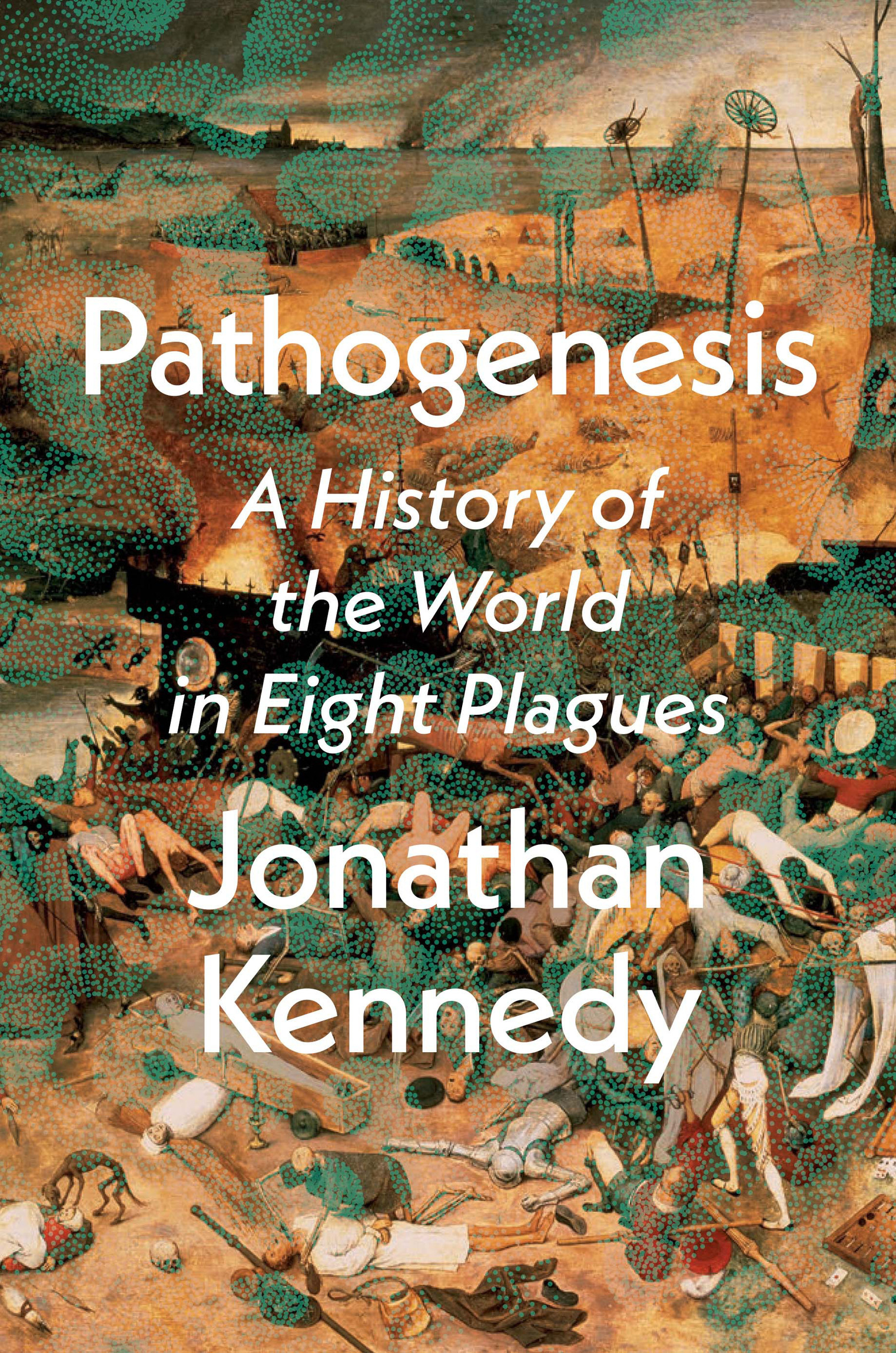
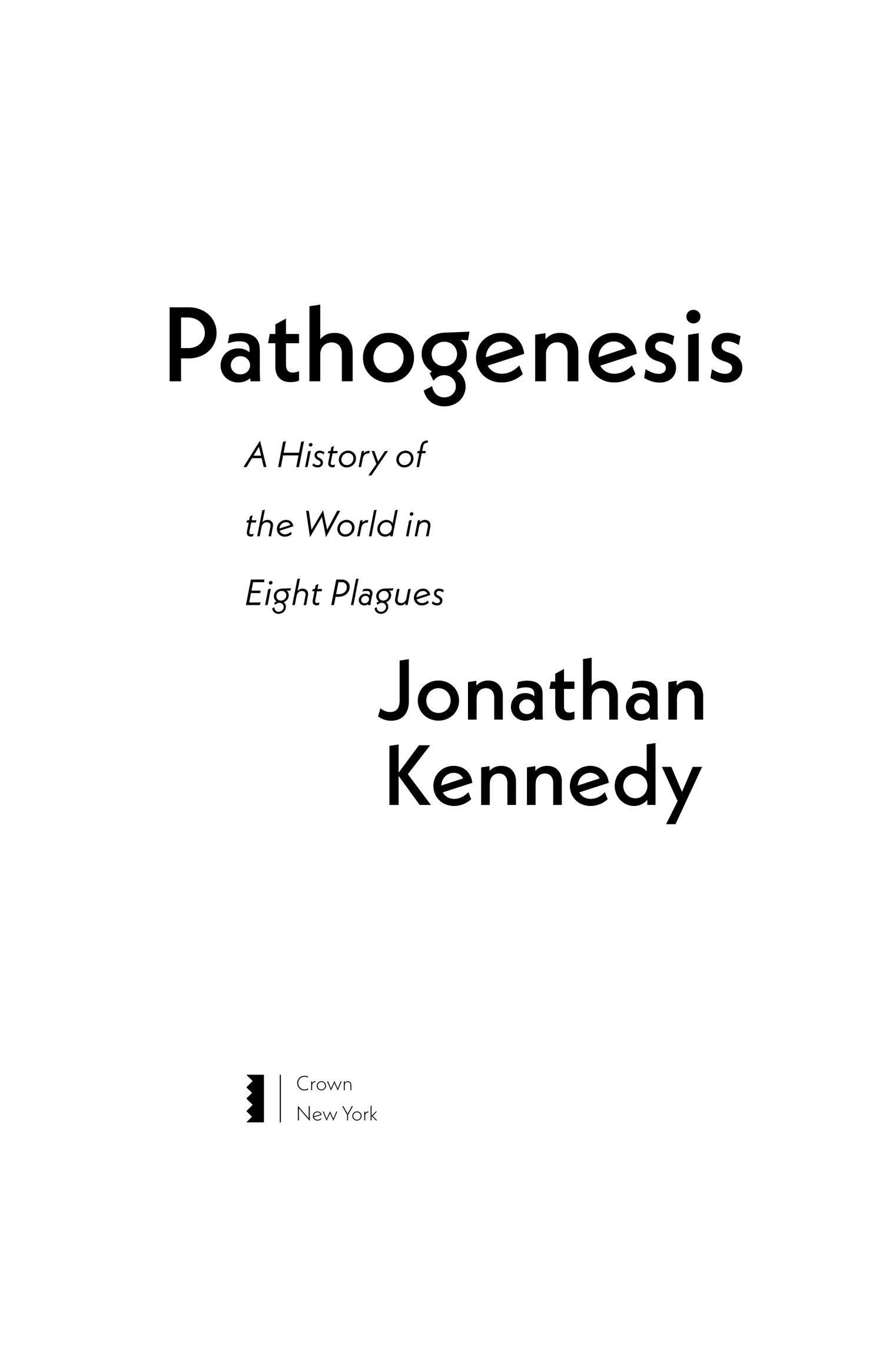
Copyright 2023 by Jonathan Kennedy
All rights reserved.
Published in the United States by Crown, an imprint of Random House, a division of Penguin Random House LLC, New York.
Crown and the Crown colophon are registered trademarks of Penguin Random House LLC.
Simultaneously published in Great Britain by Transworld, an imprint of Penguin Random House Ltd., London, and in Canada by Signal, an imprint of Random House of Canada, a division of Penguin Random House Canada Limited, Toronto.
Library of Congress Cataloging-in-Publication Data
Names: Kennedy, Jonathan, author.
Title: Pathogenesis / Jonathan Kennedy.
Description: First edition. | New York : Crown, 2023. | Includes index.
Identifiers: LCCN 2022052387 (print) | LCCN 2022052388 (ebook) | ISBN 9780593240472 (hardcover) | ISBN 9780593240489 (ebook)
Subjects: LCSH : EpidemicsHistory. | PlagueHistory. | Diseases and history.
Classification: LCC RA 649 . K 46 2023 (print) | LCC RA 649 (ebook) | DDC 614.4dc23/eng/20221114
LC record available at https://lccn.loc.gov/2022052387
LC ebook record available at https://lccn.loc.gov/2022052388
Ebook ISBN9780593240489
crownpublishing.com
Book design by Simon M. Sullivan, adapted for ebook
Cover design: Yang Kim
Cover images: Pieter Bruegel the Elder, The Triumph of Death, c. 1562, Museo del Prado, Madrid, Spain (PHAS/Universal Image Group, Getty Images), stippled pattern (yamonstro/iStock/Getty Images)
ep_prh_6.1_143150124_c0_r0
_143150124_
Where the telescope ends, the microscope begins.
Victor Hugo
According to Sigmund Freud, there have been three great revolutions in Western science and each of these dealt a blow to humans belief in their special statusor what he referred to as our naive self-love. The first, which began with Copernicus, was the revelation that the earth is not the center of the universe but just one of several planets revolving around the sun. After this setback, we could still console ourselves with the Book of Genesis claim that God created humans in his own image and gave us dominion over the land, sea and animalsalbeit in a location that was astronomically peripheral. Then Charles Darwin came along and pointed out that humans are just another species of animal and that we share a relatively recent common ancestor with apes. The third great scientific revolution, according to Freud, was his own discovery of the unconscious. The realization that we arent even in control of our thought processes was, he argued, the most irritating insult to the human mania of greatness.
Freuds suggestion that psychoanalysis is more significant than the Copernican or Darwinian revolutions seems a little, well, egotistic.
In the early seventeenth century, Galileo realized that when he reversed the order of the lenses in his telescope, very small things became visible. In all of history, Leeuwenhoeks discovery of the microscopic realm might well be the closest anyone has come to falling down the rabbit hole, climbing through the looking-glass, or stepping into a wardrobe and finding oneself in a world of fantastical creatures.
It wasnt until the second half of the nineteenth centurya full 200 years laterthat scientists finally began to comprehend the significance of the new world that Leeuwenhoek had stumbled into. And its only quite recently that researchers have begun to appreciate how bacteria and viruses perform a wide range of roles that are vital to the functioning of our planet, bodies and even our minds. Human lifeindeed, complex life in any formis inconceivable without microbes.
In the summer of 1837, fresh from a five-year voyage around the world on HMS Beagle, Darwin made a sketch in his notebook under the words I think. The unassuming doodle of what looks like the branch of a tree neatly captures the main features of what would develop into his theory of evolution by natural selection: when populations from a single species find themselves living in different surroundings, random variationcombined with natural selection for traits that provide an advantage in each particular environmenteventually result in them splitting into separate species. This process, repeated again and again over hundreds of millions of years, accounts for the kaleidoscopic variety of life forms on our planet that looks like a vast tree when mapped out on paper.
If we trace the Tree of Life to the base of its trunk, we find the Last Universal Common Ancestor (LUCA): a single-celled, bacterium-like organism that is the distant progenitor of all living things, humans included. This one shared antecedent is the reason why everything from blue whales to giant redwoods to bacteria have inherited common features such as DNA to store genetic information and a molecule called ATP that is the universal source of energy. Moving up the tree, the trunk splits into three boughs that represent the great domains of life. Two of these consist of organisms invisible to the naked eye: bacteria and archaeasingle-celled microbes that resemble bacteria. Less than 0.001 percent of all species on the planet are eukaryotes.
The American paleontologist Stephen Jay Gould argues that on any possible, reasonable, or fair criterion, bacteria areand always have beenthe dominant forms of life on earth.
Bacteria are everywhere. They have been found in Antarctic glaciers and on the ocean floor where boiling hot water surges out of the center of the earth. They live miles below ground and miles above it, where they influence the formation of clouds and possibly even lightning. But bacteria are not just ubiquitous: they have also had a profound impact on our planet.
About 2.5 billion years ago our world was almost completely submerged in water, with the exception of the odd volcanic peak piercing through the sea. Methane in the atmosphere created a greenhouse effect that kept the planet far hotter than it is today. There was little or no free oxygen in the water or air, as it was all locked up in other molecules. Life on earth consisted of anaerobic bacteria. Then the world began to change with the emergence of cyanobacteriablue-green algae that use the suns rays to power photosynthesis. This made cyanobacteria much more effective at generating energy, giving them a huge evolutionary advantage. Their numbers boomed. Over a period of several hundred million years, they pumped vast amounts of oxygena by-product of photosynthesisinto the oceans and atmosphere.
This Great Oxygenation Event transformed the planet.
Microbes continue to play a crucial role in maintaining an atmosphere that can support complex life. Cyanobacteria in the oceans still contribute to the oxygen in the atmosphere. In total, phytoplanktonphotosynthesizing microorganisms in the seaaccount for at least half of the oxygen produced by living organisms. And bacteria perform a variety of other vitally important functions. They convert carbon, nitrogen, sulfur and phosphorus into nutrients that can be used by animals, plants and fungi. When these organisms die, they return the compounds to the ecosystem through decomposition. Its no exaggeration to say that bacteria have made the planet habitable for complex life, including humans. Its a bacterial world, and were just squatting here.
Font size:
Interval:
Bookmark:
Similar books «Pathogenesis : A History of the World in Eight Plagues»
Look at similar books to Pathogenesis : A History of the World in Eight Plagues. We have selected literature similar in name and meaning in the hope of providing readers with more options to find new, interesting, not yet read works.
Discussion, reviews of the book Pathogenesis : A History of the World in Eight Plagues and just readers' own opinions. Leave your comments, write what you think about the work, its meaning or the main characters. Specify what exactly you liked and what you didn't like, and why you think so.

